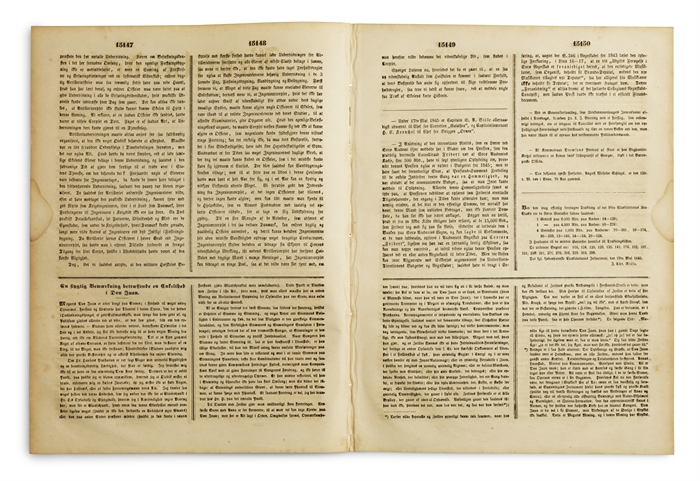KIERKEGAARD'S IMPORTANT PAPER ON DON GIOVANNI - EXCEEDINGLY SCARCE
KIERKEGAARD, SØREN.
A. En Flygtig Bemærkning betræffende en Enkelthed i Don Juan. [Printed in: Fædrelandet 6te Aarg. Nr.1890. Mandagen den 19. Maj 1845 + Nr. 1891. Tirsdagen den 20. Mai 1845, edt. Giødwad].
(København), 1845.
Large 4to (33 x 24, 8 cm). 2 columns to a page. Columns 15145 – 15160. 4 ff. + 1 f. (Følgeblad til Nr. 1890). Kierkegaard’s article is printed as a feuilleton at the bottom of the pages, beneath a printed double-line (this section is reserved for the serials), and runs from columns 15147-15153 + 15155-15159. Marginal dampstaining.
The exceedingly scarce original printing of the two issues of The Fatherland that contain Kierkegaard’s highly important article on the performance of Don Giovanni at The Royal Theatre of Copenhagen in 1845. The present paper entitled A Cursory Observation Concerning a Detail in Don Giovanni, signed “A”, is of great importance in connection with Either-Or, to which Kierkegaard indirectly refers twice. The paper is in two parts and was printed over two numbers of The Fatherland, Monday 19th of May and Tuesday 20th of May, 1845. The occasion that prompted the paper was the re-staging of Don Juan at the Royal Theatre on February 23rd, 1845. Last time, Don Juan had been performed at The Royal Theatre was the season of 1839-40, where Kierkegaard was certainly also present. The first part of Either-Or contains “A’s Papers” (note that the present paper is signed by “A” as the author); it is in this part of the work that we find the chapter about the erotic stages, The Immediate Erotic Stages, Or The Musical-Erotic, which is devoted to the music of Mozart, in particular Don Juan. For Kierkegaard, Don Juan represents sensuality. And there is no other place where the untamed power of nature is better expressed than in Mozart’s Don Juan. Mozart’s Don Juan influenced Kierkegaard more than any other work of art, and throughout his life he returns to just how magnificent it is – “A work of genious that carries the touch of eternity”. Together with The Immediate Erotic Stages, Or The Musical-Erotic in Either-Or, the present article is Kierkegaard’s most important printed piece on Don Juan. When Nielsen collected and published Kierkegaard’s newspaper articles posthumously, in 1857, he apparently did not realize that Kierkegaard was also the author of the present pseudonymous paper and did not include it in his publication. It appeared as a separately published appendix two years later, in 1859, with remarks about the references to Either-Or. Fædrelandet – litterally translated as ”The Fatherland” – was a Danish newspaper that was founded in 1834 and existed until 1882. In the beginning it appeared weekly, but in 1839, it began appearing daily. With its cultural and political contents, it soon became the leading paper of the national liberal opposition. The paper was the most important paper in Kierkegaard’s time and the one that more than any other influenced public opinion. During the first years of its existence, the paper had numerous different publishers and editors. It also ended up in numerous controversies with the censorship authorities, resulting in many trials and fines. From May 1841, the editors of the paper were Carl Ploug and J.F. Giødwad. The latter would come to play an enormous role in Kierkegaard’s authorship, as would The Fatherland itself. Giødwad was one of the very few people that Kierkegaard has ever characterized as a “personal friend” (SKS 21 214,10). It is very likely that this friendship was initiated in 1842, when Kierkegaard published his first paper in The Fatherland, Aabenbart Skriftemaal. We know that from the Christmas of 1842, Giødwad helps with the proof reading of Either-Or and is thus clearly one of the most trusted people in his life. As we shall see later, it was also Giødwad, who represented Kierkegaard in dealings with publishers and printers, when it had to do with the pseudonymous writings, thus protecting Kierkegaard’s pseudonymity and shielding him from the public. Giødwad himself said that Kierkegaard initially got a favourable impression of him when at some point he had dismissed a reader, who wished to know who was behind an anonymous paper published in The Fatherland (see A.D. Jørgensen’s statement from 1885 in Kirmmsee, Søren Kierkegaard truffet, p. 88). Kierkegaard trusted Giødwad completely, and thereby also The Fatherland. Apart from his four earliest papers in Kjøbenhavnsposten (see nr. 1 above), The Fatherland was the only paper Kierkegaard would publish in. During its entire existence, The Fatherland would be published in ca 2.000 copies, making it of the utmost scarcity today. Almost all copies of it have been destroyed, thrown out, worn, etc., and it is extremely rare on the market. The few issues we have at the moment are the only ones from this period that we have ever seen for sale. Himmelstrup 84. The present copy is no. 33 in Girsel's "Kierkegaard" (The Catalogue) which can be found here.
Order-nr.: 62268

